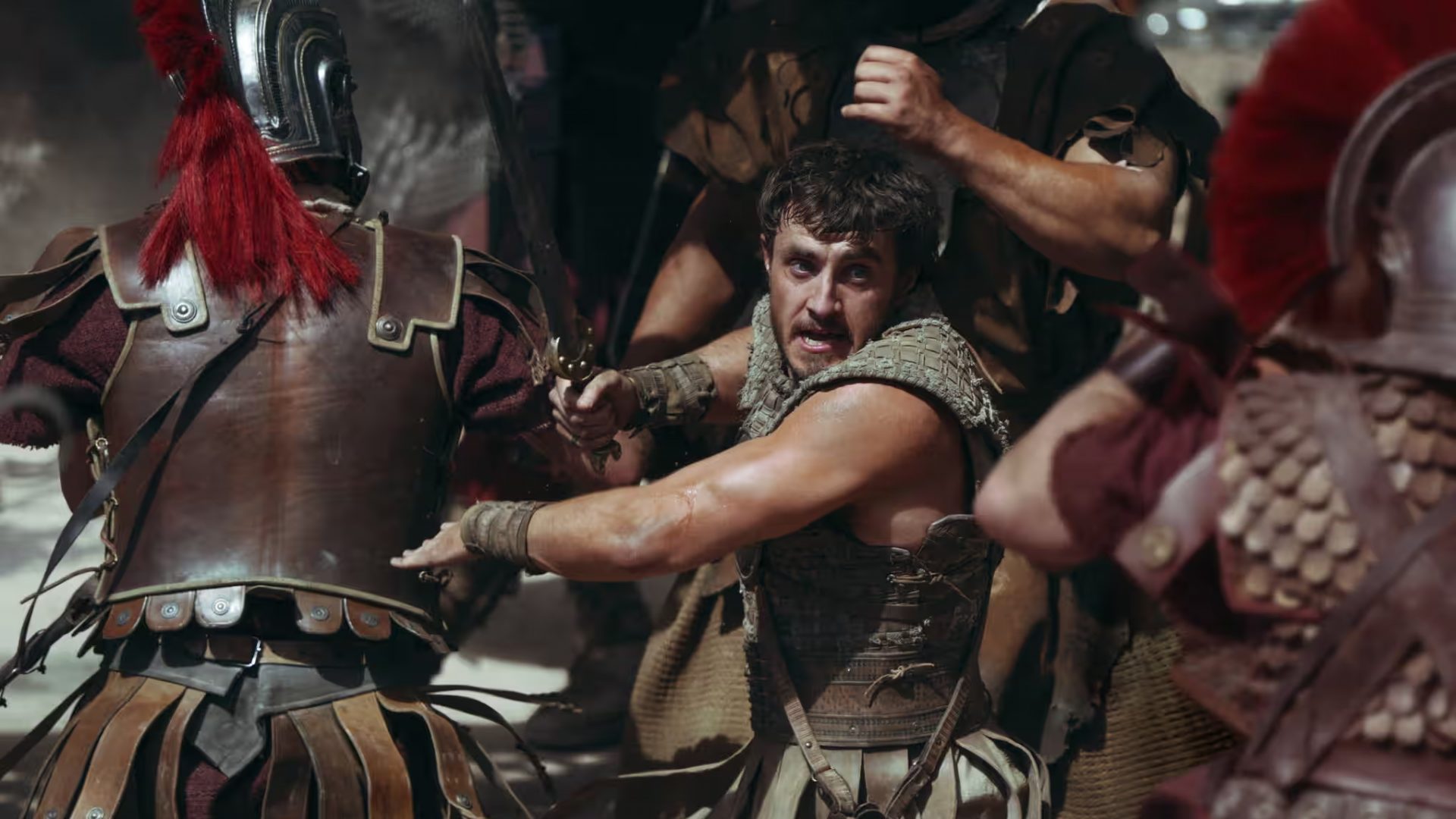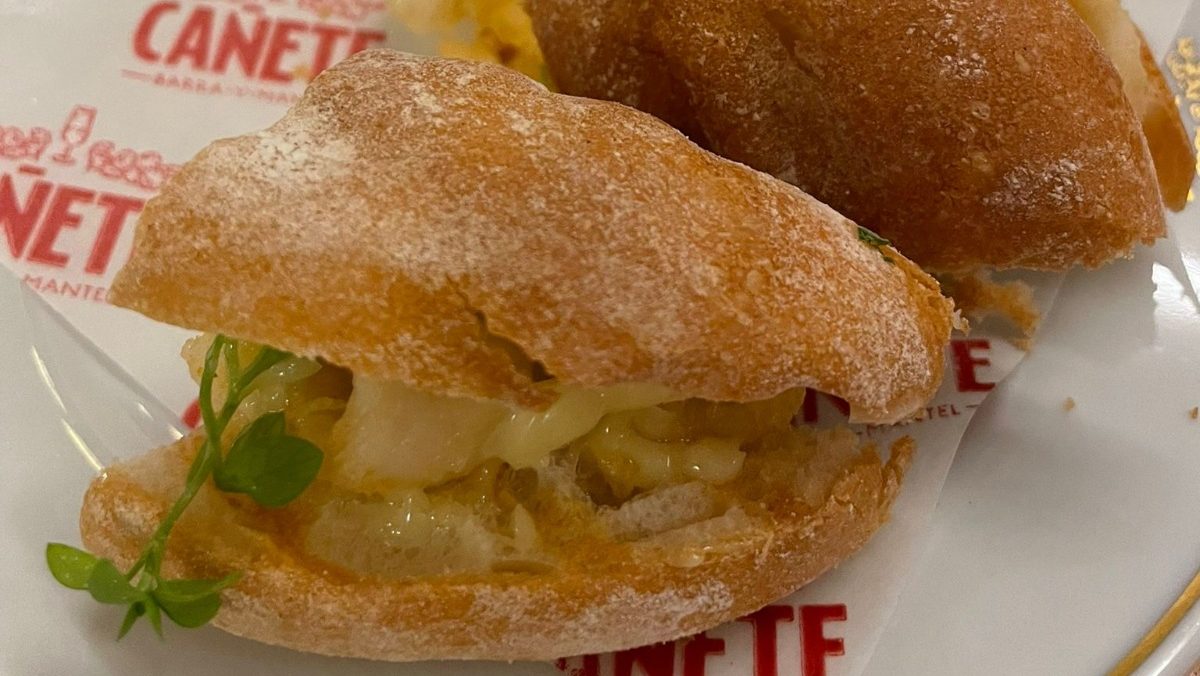It is 200 AD (around teatime) and Lucius (Paul Mescal), sent away as a boy from the murderous intrigue of Rome by his mother (Connie Nielsen, back from the first movie), has built a new life incognito in Numidia with Arishat (Yuval Gonen).
Their idyll is shattered when the Empire’s greatest general, Marcus Acacius (Pedro Pascal), arrives with his fleet and Lucius is captured, enslaved and – you guessed it – sold for training as a gladiator. His patron is Macrinus, played by Denzel Washington in movie-stealing form – almost as mean as he was in Training Day (2001).
Rome is ruled by the deranged, whey-faced brother-emperors Geta (Joseph Quinn) and Caracalla (Fred Hechinger), whose sense of social justice is fairly undeveloped. “They can eat war!” cries Caracalla when Acacius suggests it might be an idea to stop all the conquest and focus on feeding the people of the Eternal City.
If you have seen Ridley Scott’s two spin-offs of Alien (1979), Prometheus (2012) and Alien: Covenant (2012), you will know that the director’s record in franchise-building is patchy to say the least. But, 24 years after the original Gladiator made a star of Russell Crowe, this sequel is every bit as spectacular, visually breath-taking and engrossing.
In the arena, Lucius is faced with screeching CGI baboons, a very angry rhinoceros and – when the Colosseum is flooded to recreate a maritime battle – even sharks. Initially dismissed as a “barbarian”, his quotation of the Aeneid tips off a handful of attentive powerbrokers, including Macrinus, to the possibility that his backstory may be a bit grander than he has been letting on.
Along the way, he must make peace with his mother, Lucilla, who is plotting with Acacius and friendly senators to overthrow the psycho-emperors. There are plenty of throwbacks to the first movie and even a cheeky moment of homage to Spartacus (1960).
Gladiator II is cheerfully unintimidated by the burden of expectation upon it, and Scott steers a well-judged line between stunning epic and toga-clad high camp. At 86, with a number of all-time classics to his name, he has earned the right to have some fun, and he certainly does. So will audiences.
Wolf Hall: The Mirror and the Light (BBC One; iPlayer)
Nine years after the BBC’s brilliant dramatisation of Hilary Mantel’s first two Thomas Cromwell novels, the dream team of Mark Rylance in the lead role, director Peter Kosminsky and writer Peter Straughan are back to complete the acclaimed trilogy.
Anne Boleyn (Claire Foy) is dead and Henry VIII (Damian Lewis), desperate for a male heir, marries Jane Seymour (Kate Phillips), his third wife. Having promised her late mother Catherine of Aragon that he will protect her daughter Mary (Lilit Lesser), Cromwell works dexterously behind the scenes to bring about a reconciliation with her father.
Though the Tudor setting is magnificently realised, the heart of Cromwell’s story is a timeless lesson in the nature and fragility of power – a subject he debates in the gloom of his study with the spectre of Cardinal Wolsey (Jonathan Pryce).
The king, visibly ailing, remains intrigued by his most able lieutenant. “I sometimes wonder where you come from,” he says to Cromwell, now promoted to Lord Privy Seal. The literal answer is Putney, but that isn’t what Henry means.
Lady Margaret Pole (Harriet Walter), resistant to the king’s break with Rome, detests his enforcer. “You are a snake, Cromwell,” she says. “Oh no,” he replies. “A dog, madame. And on your scent”.
Rylance’s genius lies in a capacity to present Cromwell as both utterly ruthless and yet capable of empathy; the merest flicker of emotion on his usually impassive features signalling great profundity of character. BBC historical drama at its absolute best.
Orbital, by Samantha Harvey (Vintage)
As a former Booker Prize judge, I can attest to the difficulty of selecting the best work of fiction of the year. Samantha Harvey’s astonishing novella (like 2023’s Prophet Song by Paul Lynch) is an excellent choice, recognising, as Edmund de Waal, the chair of the judges, put it on Tuesday evening, the book’s “beauty and ambition [and] Harvey’s extraordinary intensity of attention to the precious and precarious world we share”.
Aptly compared to Virginia Woolf’s The Waves in its approach to form and narrative voice, Orbital is set inside a space station 250 miles above Earth, as it laps the planet 16 times in 24 hours. The six astronauts – the Russians, Roman and Anton; the Japanese Chie; the Italian Pietro; the American Shaun; and the British Nell – “are so together, and so alone, that even their thoughts, their internal mythologies, at times convene”.
Portrayed in a style that Harvey describes as “space pastoral”, the six are both busy with their routine and enraptured by what they see: “In the new morning of today’s fourth earth orbit the Saharan dust sweeps to the sea in hundred-mile ribbons. Hazy pale green shimmering sea, hazy tangerine land. This is Africa chiming with light. You can almost hear it, this light, from inside the craft”.
The crew knows that the “small and babbling pantomime of politics” cannot be escaped indefinitely but, from their celestial vantage point, such chatter seems scarcely relevant when compared to what they are experiencing. As Nell muses, “it ought to be impossible for a heavy wingless body to be gliding this freely and smoothly and yet here it is and it seems that you are finally doing the thing for which your being was born. It is hard to believe”. It is in this zone of transcendence that Orbital works its literary magic.
Yellowstone (Paramount+)
The return of Taylor Sheridan’s blockbuster neo-western drama is notable for the absence of its main character, Governor John Dutton of Montana (Kevin Costner). So the second half of the fifth (and reportedly final) season – for which fans have waited two years – immediately has a different texture to all that has preceded it.
In spite of Sheridan’s insistence to the contrary, Yellowstone is red-state pop culture to its core: nothing matters more than the land, the dying art of ranching, and resistance to the encroachments of the coastal elites. It has already spawned two spin-off series – 1883 and 1923 – with more to come. The New York Times remains essentially baffled by the success of what its commentators see as Succession for rednecks.
With Costner off the stage, Kelly Reilly takes the lead as the patriarch’s devoted and sometimes ferocious daughter, Beth. Her husband Rip Wheeler (Cole Hauser), the Duttons’ lead rancher, is off in Texas, where he encounters a revered spur maker. “When he’s gone, we’re all out of legends,” says a fellow cowboy.
Meanwhile, the feud between Beth and her brother Jamie (Wes Bentley), the state attorney general, gets even uglier. Portentous, epic in scale and shamelessly melodramatic, Yellowstone is as entertaining as ever.
Shane Gillis (3Arena, Dublin, March 21; O2 Arena, March 23)
The world’s best Donald Trump impersonator and fastest rising stand-up is coming to these islands. Gillis’s hit Netflix comedy series Tires has been renewed for a second season, while his podcast with his friend Matt McCusker, Matt and Shane’s Secret Podcast, is now Patreon’s most successful show. His humour is a hilarious window into the state of America today. Book now.




